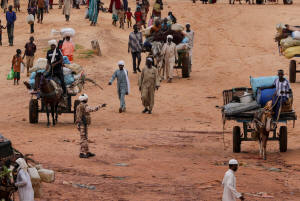Situation in Sudan 'spiralling out of control' after four months of war-
UN
 Send a link to a friend
Send a link to a friend
 [August 15, 2023]
(Reuters) - Millions of people are running out of food in
Sudan and some are dying due to lack of healthcare after four months of
war that have devastated the capital Khartoum and sparked
ethnically-driven attacks in Darfur, the United Nations warned on
Tuesday. [August 15, 2023]
(Reuters) - Millions of people are running out of food in
Sudan and some are dying due to lack of healthcare after four months of
war that have devastated the capital Khartoum and sparked
ethnically-driven attacks in Darfur, the United Nations warned on
Tuesday.
"Time is running out for farmers to plant the crops that will feed them
and their neighbors. Medical supplies are scarce. The situation is
spiraling out of control," U.N. agencies said in a joint statement.
The conflict between Sudan's army and the paramilitary Rapid Support
Forces (RSF) erupted on April 15 over tensions linked to a planned
transition to civilian rule, plunging the country into violence and
threatening to destabilize the region.
More than four million people have been displaced, including nearly one
million who have fled to neighboring countries. Civilians in
war-affected states have been killed in attacks.
"The remains of many of those killed have not been collected, identified
or buried," but the U.N. estimates that more than 4,000 have been
killed, Elizabeth Throssell, spokesperson for the High Commissioner for
Human Rights, said in a briefing in Geneva.

Reports of sexual assaults have increased by 50%, said U.N. population
fund official Laila Baker.
The millions who remain in Khartoum and cities in the Darfur and
Kordofan regions have faced rampant looting and long power,
communications and water cuts.
BLACKOUT
Large swathes of the country have been suffering from an electricity
blackout since Sunday that has also taken mobile networks offline,
according to a statement from the national electricity authority.
[to top of second column]
|

A Chadian army officer reacts as Chadian
cart owners transport belongings of Sudanese people who fled the
conflict in Sudan's Darfur region, while crossing the border between
Sudan and Chad, in Adre, Chad August 4, 2023. REUTERS/Zohra Bensemra/File
Photo

Seasonal rains that increase the risk of water-borne diseases have
destroyed or damaged the homes of up to 13,500 people, the U.N.
estimates.
In a speech on Monday, army chief General Abdel Fattah al-Burhan
accused the RSF of aiming "to take the country back to an era before
the modern state" and "committing every crime that can be imagined."
The RSF has accused the army of trying to seize full power under the
direction of loyalists of Omar al-Bashir, the autocratic leader who
was toppled during a popular uprising in 2019.
Efforts led by Saudi Arabia and the United States to negotiate a
ceasefire in the current conflict have stalled, and humanitarian
agencies have struggled to provide relief because of insecurity,
looting and bureaucratic hurdles.
(Reporting by Khalid Abdelaziz in Dubai, Nafisa Eltahir in Cairo,
and Gabrielle Tetrault-Farber in Geneva; Writing by Aidan Lewis,
Editing by Alexandra Hudson)
[© 2023 Thomson Reuters. All rights
reserved.]This material may not be published,
broadcast, rewritten or redistributed.
Thompson Reuters is solely responsible for this content.
 |